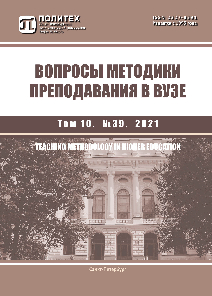ETHNOCULTURAL AND PLURILINGUAL APPROACHES TO TEACHING RUSSIAN AS A FOREIGN LANGUAGE TO STUDENTS FROM INDIA
Changes in the structure of internationalization and the increase in the number of foreign students from Asian countries in regional universities provide a basis for seeking new methods and approaches to integrate foreign students into the educational and socio-cultural environment of the region. The ethnocultural or ethno-oriented approach is gaining a basis for broader use as it considers students and their educational activities through the lens of their national culture. The significance of the ethnocultural approach is justified by its orientation towards the ethnocultural identity of foreign students, allowing it to be used for the development and cultivation of students' intercultural competence. The plurilingual approach is relevant for teaching students from countries with traditional multilingualism, such as when teaching Indian students Russian as a foreign language, where English becomes the intermediary language. The article examines the specifics of organizing educational activities for Indian students in a regional university and presents the data obtained through the survey of 110 first – third year students of the medical institute. Data analysis reveals an insufficient level of integration of foreign students into the regional environment. The authors propose and justify the use of a number of principles to develop linguistic communicative and intercultural competencies among students in Russian language classes as a foreign language. The article describes the potential use of polyfunctional tasks and other pedagogical tools to achieve the stated goal.



